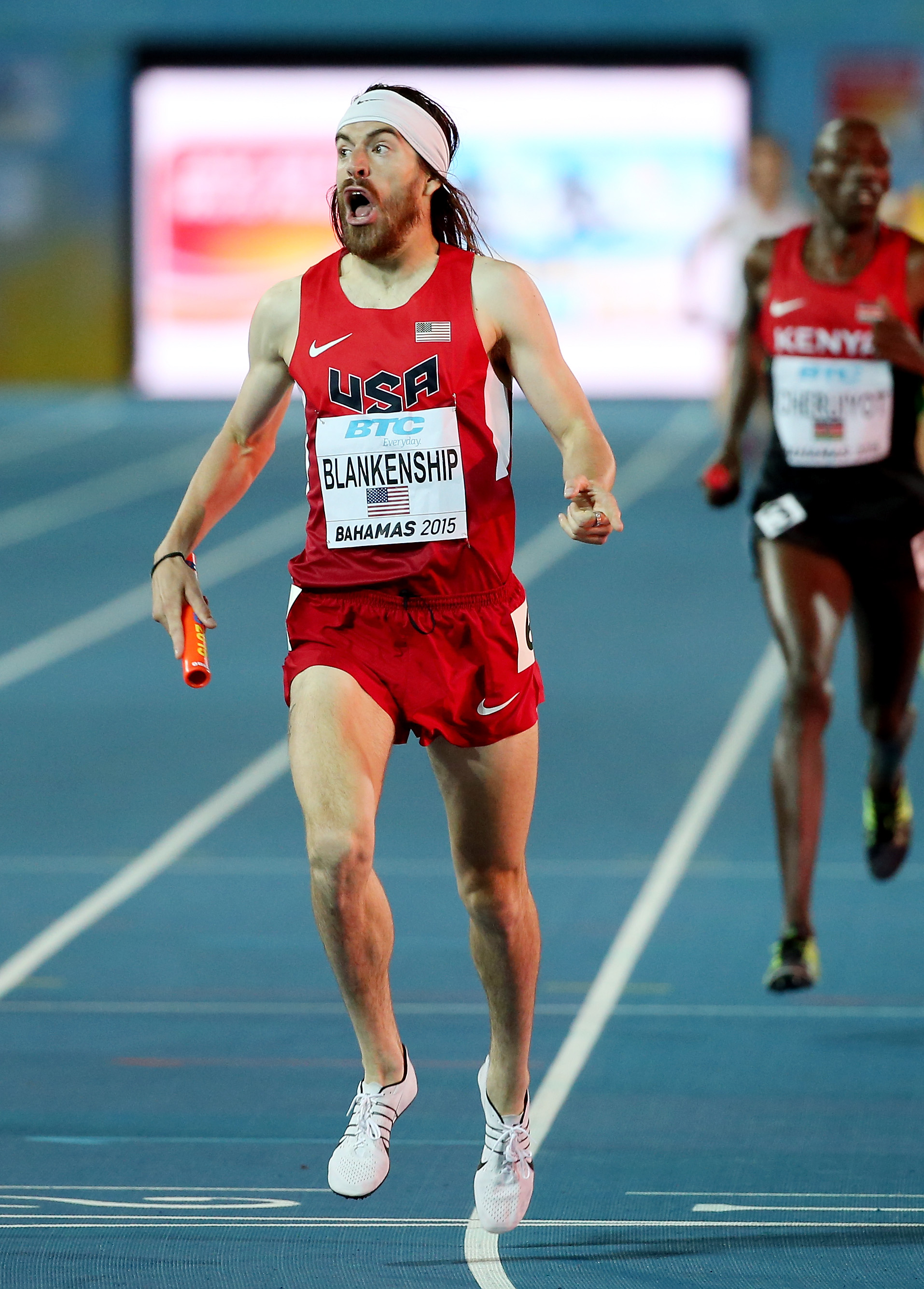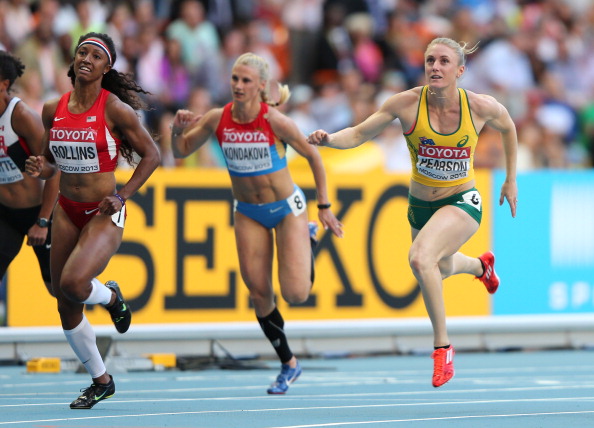NASSAU, Bahamas — At a team meeting Friday night, before this second edition of the IAAF World Relays got underway, Dennis Mitchell, one of the American team coaches, urged the U.S. runners to consider that each of them was a hammer and this, these Relays, was a construction project. Use your hammer, he said. Build something big. That they did.
The U.S. team dominated these Relays, winning all but three events.
On Sunday:
— the women’s 4x8 team won in 8:00.62, a national record and the fastest time in the world in 22 years;
— the women’s 4x4 killed it in a championship-record 3:19.39, with Sanya Richards-Ross running her leg, the third, in 48.79, looking maybe even better than she did in her Olympic-gold year;
— the men’s distance-medley team beat back the Kenyans, winning in a world-record 9:15.5 (it’s a new event);
— the men’s 4x4 team, just like last year, disappointed the home crowd by turning back the Golden Knights of the Bahamas, crossing the line in 2:58.43.
All that followed Saturday’s performance, in which the U.S. men won the 4x1, taking down Usain Bolt and the Jamaicans; the U.S. men won the 4x8, beating the Kenyans; and, of course, the U.S. women set a world record in the (once more, the new event of the) distance medley relay, 10:36.5.
Saturday would have been a perfect 4-for-4 if the U.S. women had won the 4x2. They were way ahead when Jeneba Tarmoh and Allyson Felix could not complete the final pass and tumbled to the track; Nigeria ended up winning, in 1:30.52.
On Sunday, the U.S. men’s 4x2 team was DQ’d when Isiah Young and Curtis Mitchell, Man 2 to 3, botched their pass, and the blue baton went skittering to the track and rolled two lanes over.
For the record:
Of the last 11 championships dating back to 2003, world or Olympic, including these Relays, the U.S. men’s 4x1 or 4x2 relay team has been DQ’d or DNF’d eight times — again, eight out of 11.
It’s nine of 12 if you include the retroactive doping DQ for the 2001 4x1 team.
The two bad relay passes aside, a longstanding problem, obviously — could it be that, big-picture, USA Track & Field has its stuff together not just financially but on the track, and in two ways?
One, the decision to send an A-team here to the Bahamas, where it matters to matter?
For those who might say that Kyle Merber, Bryce Spratling, Brandon Johnson and Ben Blankenship — who ran the 1200, 400, 800 and 1600 in the distance medley — aren’t exactly household names, there’s this: the U.S. is so deep, who says these guys aren’t the A team? Let’s see who makes it to Rio come Eugene in 2016.
Two, the on-track performance this early in the 2015 season — not just from the athletes but from the coaches and the behind-the-scenes support staff was, clearly, world class.
The storyline heading out of here is not just that the Americans are good.
It’s that the Americans are, on the track, badass.
So what are the Jamaicans, in particular, going to do about it? The Jamaicans spent a lot of time off the track doing a lot of talking. And?
Yes, the Jamaicans won the 4x2. Awesome.
Also, the Jamaican women, with Veronica Campbell-Brown anchoring, took down Carmelita Jeter and the Americans in the 4x1. The winning time: 42.14. The U.S. women in second: 42.32.
This is all great stuff for track and field. The sport needs rivalry. Now it has one, and it has characters to fulfill that rivalry, all the way through the world championships in late August in Beijing.
Because let’s be real — this first day of the Relays got all of one paragraph in the New York Times, and filed by the Associated Press, at that. To be taken seriously, and on a day when Mayweather-Pacquiao, the Kentucky Derby, the NBA and NHL playoffs and even more crowded for space on the sports calendar, track and field needs to be noticed.
If it was an interesting choice of sportsmanship, to say the least, for Ryan Bailey to have gone all Bolt lightning-pose and then throat-slash at the end of the 4x1 Saturday night, well, what’s done is done.
Remember, it was Bolt who called out Justin Gatlin in particular at the news conference the day before these Relays, suggesting that Gatlin had a penchant for doing a lot of talking but not saying a lot. And it was Bolt, a well-known advocate of lifetime bans for doping cheats, who about 10 days ago said that in his opinion the reduced one-year sanction Tyson Gay received in 2013 for a doping offense — after cooperating with authorities — was “the stupidest thing I’ve ever heard.”
Bolt also said in that report, “I feel like he let me down, and he let the sport down.”
At a late-night news conference Saturday, Gay — with Bolt listening — said, among other things, “I ask for forgiveness for a mistake.”
Bolt was in no mood Saturday for lightheartedness. He spent most of the news conference with his arms and legs crossed, his body language signaling that while the Americans might have won this round, there is more to come.
Indeed, the stats showed that while Bailey ran an 8.83 anchor, Bolt — who is still far from in top shape — ran an 8.65.
If those times seem like freak-of-nature times for both, there’s this: the batons at these Relays had transponders in them.
The precision for which that allows may be such that all of us have to recalibrate the way we think of relay splits going forward.
A focused, determined Bolt can only be good for track and field.
Plus, a Bolt who has the support of his team — all the better.
This from Warren Weir on Twitter:
You don't ever dis a legend even if yal are rivals it's like you're a nobody celebrating on Ronaldinho you look stupid.
— Warren Weir (@Warren_Weir) May 3, 2015
Followed by this:
@RBailey_sprints pic.twitter.com/4YMEI8LYYq
— Warren Weir (@Warren_Weir) May 3, 2015
Also, this from Asafa Powell on Twitter:
#TeamJamaica >RT @daveed98: Ryan Bailey is a meek man, remember no @YohanBlake no @officialasafa will will ... http://t.co/W3Ng9BW4Fr — Asafa Powell (@officialasafa) May 3, 2015
Ah, Powell.
In a world in which you’re going to argue that a doping offense deserves a lifetime ban, where does Powell fall? His 18-month ban for oxilofrine in a supplement called Epiphany D1 was cut to six, and he returned to action last year; this weekend, he ran at a meet in Guadalupe, running a windy 10.08 in the 100.
Theory in dealing with doping stuff is one thing. Dealing with real-world problems on the track is another.
The Jamaicans have to confront a challenge with the U.S. men’s 4x1 relay, and surely they know it.
Bolt is the fastest man in history in the 100, at 9.58.
But Gay is tied for second-fastest, at 9.69, and Gatlin is fifth-fastest, at 9.77. Mike Rodgers, who ran the lead-off leg Saturday, is in a three-way tie for the 12th-fastest 100 of all-time, at 9.85.
The strategy is clearly this: give Bailey a big-enough lead so that not even Bolt can catch up.
What are the Jamaicans to do? They are now playing catch-up. Who are they going to counter with?
Blake has also run a 9.69. Powell has a 9.72 and a 9.74, but those times were seven and eight years ago, respectively.
If the Jamaicans keep Nesta Carter in the lead, and then — to counter Gatlin and Gay in positions two and three — run Bolt and Blake in their two and three spots, who would run anchor? Weir?
Given a chance to run Bolt Sunday night in the anchor slot against Gatlin in the 4x2, the Jamaicans put in Weir. Bolt did not run at all on Sunday.
There are lots and lots of reasons why that could, and plausibly should, be the case.
There’s this, though — for track and field to be the real deal again, it needs its biggest stars to run against its each other, and as much as possible.
What the U.S. men’s 4x2 DQ Sunday obscured is this: Gatlin got the stick in seventh. He finished in third.
Oh, to have seen Gatlin run clean against Weir, right? Or … Bolt.
The championships in Bejing go down in late August.
Let’s get it on.







